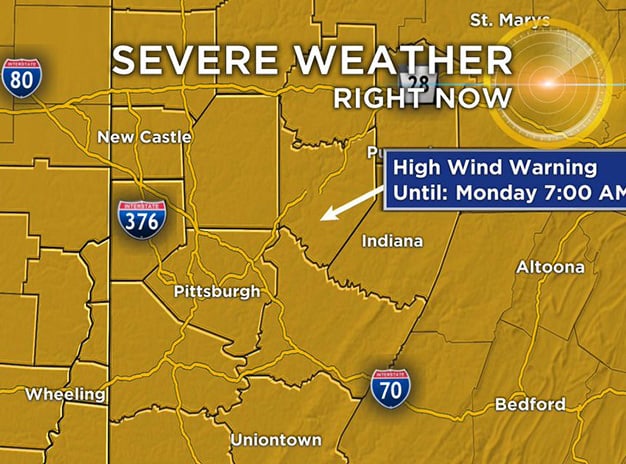Over 140,000 households suffered a loss of power throughout southwestern Pennsylvania due to yesterday’s windstorm. After an event like this, it is a good time to ask: are you prepared for severe weather and have your taken steps to mitigate property risk?
Here’s a quick overview during a weather advisory that our clients find helpful:
General loss prevention tips
- Designate a safe location for your family
- Keep a disaster preparedness kit at your home and in your vehicle. At a minimum, this should include water, non-perishable food, a first-aid kit, a battery-powered radio, flashlights, and extra batteries.
- Install impact-resistant windows throughout your home.
- Keep all vehicles parked in your garage or under a carport when at home
- Have your roof inspected regularly for any signs of wear that may lead to more damage during a storm.
Hail
- Minimize damage to the roof and interior of your home by using Class 4v UL-rated shingles.
- Stay away from doors, windows, and skylights as glass can be easily shattered.
- Keep all blinds and curtains closed to ensure that any resulting broken glass does not blow into your home.
- If you are caught driving during a hailstorm, try to find a nearby parking garage, overpass or other structure with a sturdy roof to protect yourself and your vehicle.
Lightning
- If you live in an area prone to lightning strikes we recommend putting your entire home on a surge-protection system, especially if it is equipped with home automation technology.
- Employ a licensed electrician to install a lightning protection system on your home. The Insurance Information Institute offers general guidelines on choosing an appropriate system at www.iii.org/video/how-pick-lightning-protection-system.
- Unplug electronic equipment and appliances before the storm arrives. Do not use landline telephones or computers unless it is an emergency. Utility lines and pipes can carry an electric current underground and through buildings.
- If you are caught outside when lightning hits, avoid being near lakes, open water and trees. Do not stand by fences, telephone poles, pipelines, or any other vertical or metal objects that can attract a lightning strike.
Straight-line winds
- Be sure to keep trees and bushes on your property well-groomed. Branches can cause major damage if swept up by the wind.
- Clear all debris from drains and gutters
- Install garage doors that are certified for higher wind speeds. A secondary option is to install wood or metal stiffeners for reinforcement.
- Strap your roof to the wall studs beneath to prevent it from being lifted by strong winds.
- If you live in an area prone to strong winds, we recommend using permanent storm shutters over all windows. Usually made of aluminum or steel, these may be motor-driven or manually operated. If you opt for motor-driven shutters, ensure that they can be manually operated in case of a power outage.
- Consider purchasing a whole-home backup generator in case of a power outage to keep your home operating at its normal capacity.
Tornados
- Secure all lawn furniture and other loose objects around your property. Most structural damage done by tornadoes is caused by violent winds and debris slamming into buildings.wetahe
- Consider installing a residential safe to store important documents and other valuable loose belongings.
- Locate shut-offs for electrical, gas, and water systems in your home and make sure that all family members know their locations. Keep necessary shut-off tools easily accessible.
- A safe room is the only space that is truly secure from a tornado. Find out how to install one in your home on FEMA’s website: fema.gov/safe-rooms/residential-safe-rooms.
- If your home does not have a safe room , head to the innermost room in the basement or first floor. Make sure all doors and windows are shut.
- If you are driving while a tornado hits, seek shelter immediately rather than continuing to drive. Do not seek shelter under an overpass as winds can be even stronger and you can be more susceptible to injuries from flying debris.
- No matter your location, keep your cell phone with you at all times as landlines may easily be cut. Do not rely solely on tornado sirens as they may be disabled by a storm.
After a severe storm strikes
- Always carefully assess your surroundings following a disaster. Do noweathert move until safe to do so.
- Document any resulting damage, then immediately contact your insurance agent to begin the claims process.
Henderson Brothers offers this information to assist you in the making decisions that can help mitigate your risk. While we cannot address every possible scenario or guarantee these tips will work for you, our goal is to support your efforts to protect yourself and your family. For a comprehensive policy review, please call us at 412-261-1842.
Please note that the information contained in this posting is designed to provide authoritative and accurate information, in regard to the subject matter covered. However, it is not provided as legal or tax advice and no representation is made as to the sufficiency for your specific company’s needs. This post should be reviewed by your legal counsel or tax consultant before use.


